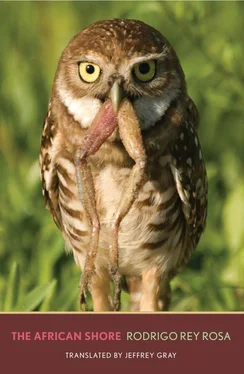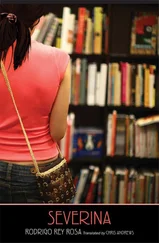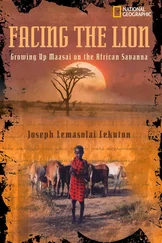They walked down toward the Avenida de España, where she had parked the car. He put his suitcase in the seat behind her and placed the owl’s cage on top of it.
“In Morocco, people don’t like to get to the bottom of things. No one wants to talk about something that seems wrong to us,” said the voice of Nadia Yassin, the daughter of the fundamentalist leader imprisoned in Slá, who was being interviewed by Radio Medi-1.
“Let’s be clear,” said the interviewer. “What you people want is revolution.”
“No,” said the young woman. “But we do want radical change. And we don’t just want to change things; we want to change mankind. ”
“What do you think?” asked Mme. Choiseul, turning off the radio.
“She’s not stupid.”
“She sounds like a French high-school student.”
They drove on in silence, getting farther away from the center of Tangier, heading toward the Zoco de los Bueyes. They went down California and kept on toward Monte Viejo on Vasco da Gama.
The little Pekingese met them at the front door.
“Follow me. I’ll show you your bedroom. I hope you like it.” She smiled.
The bedroom was in the lowest part of the garden, a little cottage in Moorish style, flanked by Roman cypresses. Inside, it was generously carpeted; cushions of various sizes and colors were piled on the bed. In one corner, a small fireplace waited to be lit. Through an arched window one could see, in the distance, the hump of Mount M’Jimet, dotted with little cubical houses.
“What do you think?”
“It’s wonderful.”
Mme. Choiseul set the cage down on a small inlaid table near the window. The owl was listening attentively, now with one ear, now the other, to what was going on around it.
“This is the life,” he said to himself when he was alone, lying on the bed with his hands crossed behind his head. Beyond the window mullion and the cypresses, hundreds of starlings and sparrows were crying and streaking the blue-gold of afternoon.
“It can’t last,” he thought.
Julie, with her small prow-like face, walked beside him on the white sand beach, which faded in the distance to the south of Ras Achakar. There lay the ruins of Cotta, she said, where, for centuries, the Romans had pressed olives for oil and seasoned sardines and tuna.
“This is where they cut off the heads, entrails, fins, and tails, which they used to make fish paste,” Julie explained. “The floor was built of perfectly hewn flagstones — there are still some fragments.” She wanted to continue the excavations that Princess Rúspoli had started in the 1950s and that the Moroccan government had forced her to abandon after Independence.
They had walked past a large heap of stones, each one numbered (by order of the deceased princess, Julie said) like pieces of a huge jigsaw puzzle, which one day would all fit together to rebuild the Roman baths. Over the sea hung a hazy castle of dust, its colors mixing and changing hue in the western sun.
“Maybe I’ll come back next year,” Julie said. “But I’d need a permit from His Cherifian Majesty, and I don’t think I’ll get it, unless Christine talks to somebody in Rabat. At any rate, next week I’m going to start a course in Maghrebi Arabic. Without the language, I don’t think I can accomplish much.”
“I envy you.” He took her hand.
Julie gave him a solemn smile.
“Your wife—,” she said then, without looking at him, “doesn’t it bother you to cheat on her?”
“Yes, but I don’t have any choice.”
“That’s hard for me to understand.”
In the past, a phrase from Chamfort had worked for him:
“Laura,” he said, “is the kind of woman it’s impossible not to cheat on.”
“What does that mean?” Julie asked, somewhat offended.
“That she’s the kind of woman it’s impossible to leave.” He smiled.
“Oh, I see,” said Julie in a low voice. Then, between her teeth: “Imbécile.”
She stopped, turning on her heels.
“What’s wrong?”
“Nothing.”
“Are you annoyed?”
“No.”
They walked in silence, casting long shadows on the sand, toward the rock embankment at the end of the beach where they’d left the car.
Failing to find Rashid at the Tingis, he walked down to the port and took a taxi.
“To the Boulevard?”
“No, to Monte Viejo, please,” he said in Maghrebi. “Do you know where it is?”
“Yes,” said the driver and looked at him. “Are you Moroccan?”
“No.”
“Tunisian?”
“No.”
“Egyptian?”
“No.”
“Where are you from?”
“Colombia.”
“But they speak Arabic in Colombia?”
“No. Spanish.”
“We speak Spanish here too,” said the driver in Tangerine Spanish. “What’s it like in your country?”
“More or less like here.”
“Horrible, in other words.”
“That’s about it.”
The radio was broadcasting a Moroccan football game. The driver asked if they bet on sports in Colombia.
“Not as much as they do here.”
“It’s an interesting game. You can win a lot of money.”
“If you’re lucky, I guess.”
“I think you are a lucky man.”
“I don’t know,” he said. “Luck comes and goes.”
“You’re right there, my friend.”
The Mercedes turned rather dangerously down the slope toward the California district.
“You are learning Arabic.”
“I’d like to.”
“Do you like Morocco?”
“Very much.”
“There you are. Do you know what Islam is?”
“Of course.”
“No, I’m asking if you know what it really is. Are you a Muslim?”
“No, no. I’m a Christian.”
“How are you going to know what Islam is if you’re not a Muslim?”
“You have a point.”
“Well. If you want to, you can convert to Islam. You only need to say. .”
“Yes, I know. It’s been explained to me.”
“Well, khay —then you will understand. You’re not a Jew, are you?”
“No.”
“Well, then, there is no problem. If you want to, you can become a Muslim.”
They continued along Vasco da Gama toward the Sidi Mesmudi road and passed in front of the country estate of one of the princesses of Kuwait.
“Here only the very rich live,” said the driver with contempt. He felt a strange shame on behalf of the rich.
“Here it is,” he said when they arrived at Mme. Choiseul’s home.
“Here?” The driver stopped the Mercedes in front of the door. “That’s a hundred dirhams,” he said.
“How’s that?”
“ Mía dirham. One hundred dirhams.”
“That’s way too much.”
“Too much? Well, give me eighty.”
“Twenty is what I’m used to paying.”
The driver, without looking at him, shook his head. “All right, fifty.”
“Thirty,” he replied, counting his coins, “thirty is all I’m going to give you.”
He stretched out his hand with the money, but the driver would not take it. He stepped out of the taxi, leaving the money on the seat. He was closing the door when the driver screamed furiously:
“Intina yehudi!”
On the Tangier side, thousands of swallows were taking flight in a block against the huge screen of the sky, each one a point in a net that was changing its form, weaving and unweaving at the whim of some natural intelligence.
The owl opened its eyes onto the hungry, liquid light of the dusk. It turned one ear toward the window, better to hear the sounds that filled the air of the sunset and mixed with the steady murmur of the breeze rising from the sea. A man was shouting, as he did every afternoon at this time. The birds continued scratching the sky or crying from the branches. Several mosquitoes buzzed near the window and some moths began to flutter close, drawn by the sun’s last rays in the window panes. A lizard’s skin scraped as it crawled through a crevice under the window. The dry leaves, the dust, a dead beetle — all were swept up by the wind. A grasshopper flew over the lawn. The old Moroccan who tended the fire carried out the meaningless movements he always made at this hour — you could hear the sound of his feet and knees shifting on the straw mat.
Читать дальше












